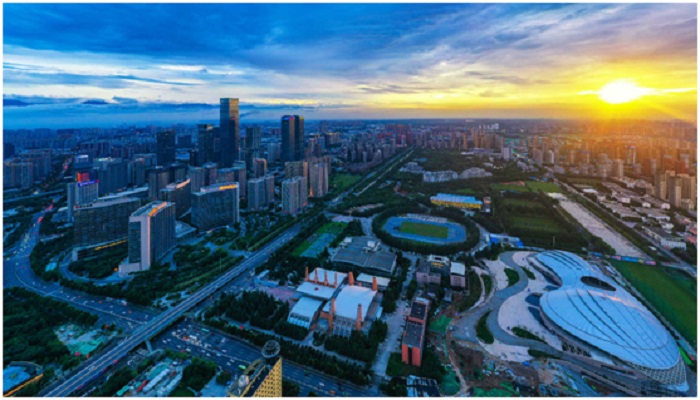



I live in the northern part of Xi’an, northwest China’s Shaanxi province. Subway is a major way of transportation for me. It takes less than 10 minutes of walk for me to arrive at the nearest subway station, so it’s also convenient to go to the places along subway lines.
At present, Xi’an has opened four subway lines, and two of them pass through the northern part of the city. Zhangjiabu, on the northern outskirt of the city, is now a transfer hub where passengers can take the Line 2 to go to the Xi’an North railway station and get to an intercity rail for the airport after only one transfer.
I moved to the northern part of Xi’an 20 years ago from a small county outside Shaanxi province. I still remember that when I first arrived here, the residential complex that I lived in was surrounded by cropland and livestock farms. A rapeseed field was also near it.
Besides, there was a roundabout in Zhangjiabu, the “north gate” of Xi’an, where out-of-town truck rivers always lost their way. Therefore, guiding even became a business for some local residents.
Gradually I came to realize that the northern part of the city was usually not a choice for people to settle in due to its slow development. Even some stayed, but it was just temporary.
I remember going down town to watch my first movie in the city since I came here, but when the movie was over, many taxi drivers refused to pick me up when learning I lived in the north. They did so because they were afraid that their cabins might be left empty when going back, which was obviously a bad bargain.
The demand for transportation depends on economic vitality, passenger flow and gathering of people. When Xi’an gradually completed its gridded planning for the north, the region started to gain popularity. The increasingly prospering commerce there also promoted the improvement of infrastructure. A developed road network has been established, and three bus stations were around my residence.
Weiyang Road, which leads to the north, is a two-direction multi-lane arterial road that is always jammed today. To alleviate the traffic pressure, the use of private vehicles has been restricted based on even- and odd-numbered license plates. I used to sigh for the lack of vigor in the region, but now I’m pleased to see its prosperity.
Therefore, to build a transportation channel in the north under the ground became urgent, and the city’s decision to launch a subway project was sensational. I used to imagine that Xi’an might have its own subway one day when I was taking Beijing metro, so I was surprised as I learned a subway line was about to be constructed in the city, from Zhangjiabu. The construction of the subway line also became a hot topic for chinwags among friends and neighbors.
The subway line lies on the central axle of Xi’an and connects the northern and southern parts of the city. The stations along it are all places that I always go to. Thanks to the subway line, I don’t have to wait for buses any more.
The line started operation in 2011, and three new lines were later put into use in the city. Now, the city is planning to build more routes. As I learned, several new lines are expected to be opened before the end of the year. For instance, the Line 10 will stretch further north to the bank of the Weihe River.
Today, taking subway is not a fresh experience for me anymore, but the importance of subway has never been reduced in my life.
Zhangjiabu, where Xi’an’s subway project started, also has a “turnabout” under it that transfers passengers. With magnificent commercial complexes standing on it, the place has become a magnet for young people.
When the subway was constructed, an overpass was also newly added to the north. Today, the northern part of Xi’an has developed into a prosperous area that has a number of landmark sites, including Xi’an’s municipal stadium and library, as well as the Xi’an North railway station. Besides, the municipal government of the city has also moved to the region. The northern part is becoming another center of the city.


The Executive and members of the.


The Acting Director, FCT Directorate of.


President Bola Ahmed Tinubu has been.



Barely a month after resignation of.


An Abuja based Legal Practitioner, Osuagwu.



Convener of Equitable Remedy, Mrs. Magaret.


Contractors handling the contract for city.


Nigerian government may have concluded plans.


The Diplomatic Correspondents Association of Nigeria.


A rights group, “Follow Me Talk.
Leave a Comment